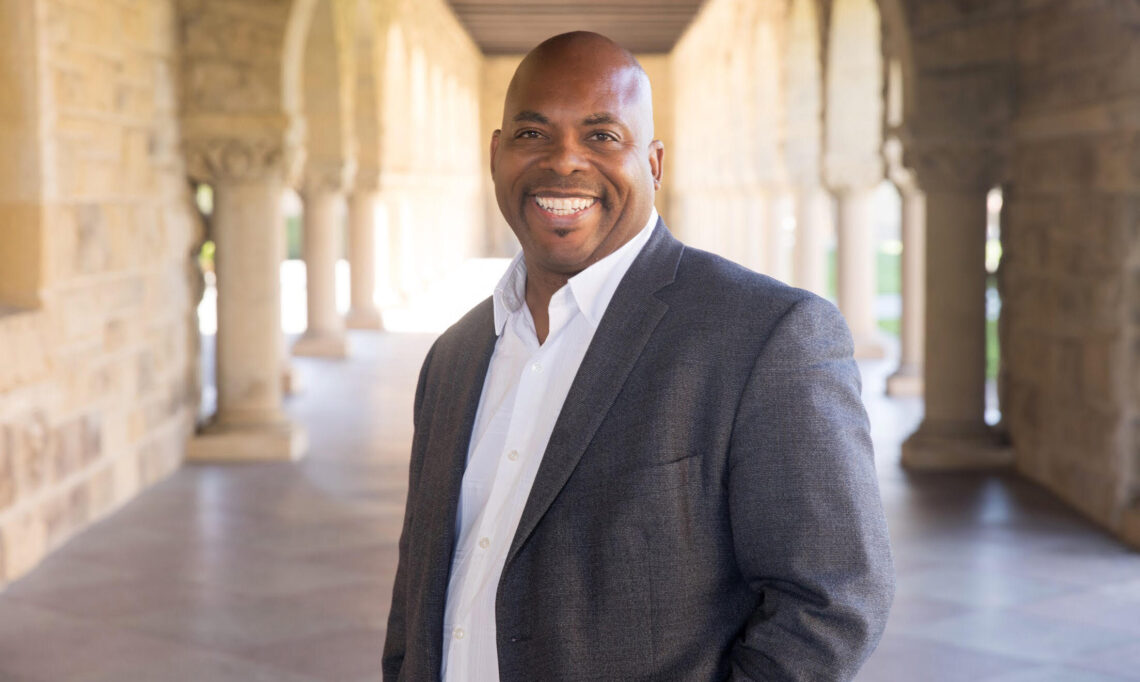
Michael D. Bolden. Photo by Douglas Zimmerman.
Journalist Michael D. Bolden will be UC Berkeley Journalism’s eighth permanent dean, promising a dedication to collaboration, innovation and courage in the face of threats to the field, campus announced today.
“I’m thrilled that we succeeded in recruiting such a distinguished journalist — with multifaceted experience, an expansive vision and full of heart — to lead our acclaimed School of Journalism,” said UC Berkeley Chancellor Rich Lyons. “In these times of unprecedented challenges for journalism, the ‘truth in society’ role it plays has never been more important. Michael Bolden is uniquely suited to help educate and prepare our next generation of journalists.”
Currently the CEO and Executive Director of the American Press Institute (API), Bolden has had a distinguished career that has taken him from the New Orleans Times-Picayune to the Washington Post and San Francisco Chronicle, the John S. Knight Fellowship program at Stanford University and API. He has worked as a local reporter and national editor, a teacher and nonprofit leader.
At the San Francisco Chronicle, as director of culture and operations, one of the organization’s masthead editors, he helped the newsroom respond to online harassment and abuse. During the pandemic, he co-developed a new remote John S. Knight Journalism Fellowship at Stanford University to improve how journalists serve communities of color.
At API, Bolden updated the organization’s focus toward inclusion, civic discourse, community engagement and newsroom sustainability to address the urgent needs of a changing field. He will depart API in mid-July.
At a time of great challenges to journalism and democracy, Bolden says there’s no place he’d rather be than at Berkeley.
“I am awed by the excellent storytelling and investigations that the Berkeley Journalism teams produce in every medium,” Bolden said. “We can help correct systemic problems in the industry that have contributed to the loss of trust in the media and inspire a collaborative future of innovation, experimentation and joy.”
Bolden, who lectured at and holds a master’s degree from Stanford University, will focus on preparing the next generation of journalists to meet the evolving information needs of a complex, diverse society. He says that students must learn not only how to report across media, but also to understand how newsrooms function and be able to withstand the pressures of a stressful field — not just to survive as journalists, but to thrive.
Bolden says that as dean he will draw on his multifaceted experience in journalism and prioritize collaboration to benefit the school community as well as the industry.
As the editorial director for the John S. and James L. Knight Foundation for four years, he said he learned the importance of working across sectors — from celebrating arts and culture, to championing free expression and journalism, to increasing community impact through vibrant engagement, he said.
“We need to look across barriers inside news organizations and beyond divisions that separate newsrooms from the community and other sectors, such as sociology, public policy, environmental design, community development and more,” Bolden said. “They are all intertwined, and we can learn from one another and work together to create solutions to our most persistent problems.”
Growing up in Alabama
Bolden grew up in Mobile, Alabama, the son of a Baptist minister father with a sixth-grade education and a mother with a background in corporate security who came from a family of educators. His parents encouraged immersion in a rich variety of media. They were voracious readers and news consumers, who read the daily newspaper, the weekly Mobile Beacon, which served the Black community, and Ebony and Jet magazines. It always seemed, he said, the family TV was tuned to CNN, The Weather Channel or local TV news.
“My parents believed in being informed about the world around them, so that they could help our community make good decisions,” he said. “I don’t think they ever missed an election; for them, voting was an act of service.”
As a child, Bolden said he learned from “Sesame Street” and “The Electric Company” on PBS, which he considers “a national necessity,” and he would read the family’s World Book Encyclopedias for fun. His mother would do the crossword puzzle in pen — something he says he’d never attempt (though he is a Wordle fan). He had eight siblings — six of whom went to college.
Bolden says that when he thinks about today’s threats to journalism, democracy and the rule of law, he thinks about his parents living in the Deep South in Alabama during the Jim Crow era and recalls the sacrifices they made and the strength they demonstrated. About his father, he said: “Whether it was walking through a back door, drinking out of separate fountains or being called ‘boy’ — everything that he and his generation endured, none of what we face now is greater than what they faced.”
He says that as a Black gay man, he has faced assaults on his own humanity as well.
“All of that has shaped my experience, and I think has made me more human and more empathetic,” Bolden said. “I am someone who has felt deeply and who feels deeply for people. That is rooted in my own experience.”
Bolden’s trajectory
Bolden’s career in journalism started in high school, when he reported for his school newspaper and for the CBS affiliate’s “Youth Magazine” program in Mobile. At the University of Alabama, where he earned his BA, Bolden participated in a Dow Jones workshop and The New York Times Scholars Program, where he met Paul Delaney, the first Black editor at The New York Times and a founder of the National Association of Black Journalists (NABJ).
Bolden’s first professional opportunity came after attending an NABJ regional conference, where he met Jim Amoss, then-city editor of the New Orleans Times-Picayune. Amoss, who became the paper’s top editor, offered him an internship while he was still finishing at the University of Alabama and then — after a tryout — gave him a job on the national desk as a copy editor.
From New Orleans, Bolden went to the Northwest Florida Daily News where he said he “learned how to churn stories” — sometimes three a day. In Florida, he also got his first taste of story editing, in an informal capacity as a “story coach,” then as chief of the paper’s Destin bureau. He worked with his fellow reporters who, he said, taught him a lot about the need for care and empathy in documenting and conveying people’s stories.
He was recruited to the Miami Herald where he was deputy chief on the features copy desk, which included multiple sections: daily Living & Arts, Sunday Arts, Food, Health and the Weekend entertainment guide. He was put in charge of production for several features sections and became editor of the weekly TV guide. Production — actual physical layout of some sections — sometimes ran to midnight or 1 o’clock in the morning. Bolden said he sought to fix the workflow so that people could have more work-life balance and the paper could be produced as efficiently as possible.
At the Washington Post, Bolden designed and edited for the Style section before going to the Washington Post Magazine, where he was in charge of systems, edited special issues, and served as a liaison to the business and advertising side of the shop. Bolden’s last job at the Post was as part of the leadership team that coordinated the merger of the then-separate digital and print operations.
He was also the Washington Post’s Transportation and Development editor, managing coverage of everything from potholes to plane crashes. While managing coverage of “Snowmageddon” in February 2010 — a pair of significant blizzards that hobbled the Washington, D.C.-area — one of the most important things he could do was make sure the two lead writers had water or had a sandwich to keep them going, he said. “And so that’s always sort of been my philosophy in terms of working in newsrooms and being a news leader. What do I need to do to empower people to be their best?”
‘…know your community…love your community’
One of Bolden’s key takeaways from his sweeping mix of journalism experience is that reporters need to be locally engaged in order to do their best work and to instill trust, which is sorely lacking right now.
“You have to know your community, be part of your community, and not be afraid to say you love your community,” he said, as he looks forward to teaching and mentoring the next generation of journalism students.

Michael Bolden’s dogs Grace and Gabriella.
Bolden will come to his new community in Berkeley from his current home outside of Washington, D.C., with his two beloved Sheepadoodles, Grace and Gabriella. He says their complete affection and devotion helped him to make it through the pandemic and uplift him to this day. At a time when loneliness is considered a national epidemic, Bolden says finding connection is essential — and that it is something that journalists and news organizations must help facilitate.
“Having these reminders and these support systems and thinking about how we can be there for one another … that’s all part of how we heal as a people and a community and a society.”
Bolden, who is set to begin as dean on August 1, succeeds Dean Geeta Anand. Professor Elena Conis, who has led the school since September 2024, will continue as Interim Dean through the end of July.
_____________________________________________
Media Requests
Andrea Lampros
journalism@berkeley.edu
510.847.4469


